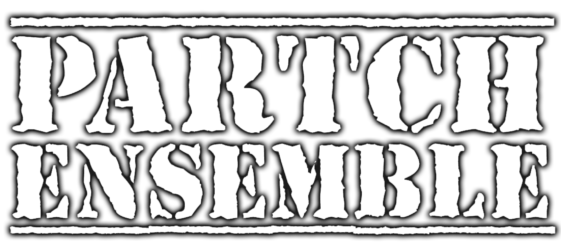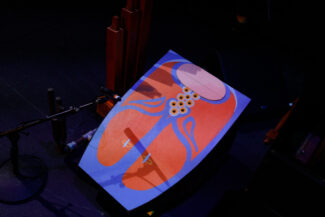Recreation of a instrument designed by Harry Partch
Videos with Bloboy
-
Notes
Bass & Diamond Marimbas ~ Boo ~ BloBoy ~ Castor & Pollux Canons ~ Chromelodeon ~ Kithara II ~ Surrogate Kithara ~ Spoils of War
“A collection of musical compositions based on the spoken and written words of hobos and other characters—the result of my wanderings in the Western part of the United States from 1935 to 1941.”
~ Harry Partch on The Wayward
Program note by John Schneider:
In 1957, Partch described this final version of U.S. Highball as, “…the most creative piece of music I ever wrote, and in the sense that it is less influenced by the forms and attitudes that I had grown up with as a child and experienced later in adult life, there can be no doubt of it.” The initial version was sketched out with guitar & solo voice, followed six months later by an expanded version for voice, guitar, kithara & chromelodeon. But he soon realized that the work really needed percussion instruments, and nine years later, he created the work you hear tonight. It describes his 1941 two-week freight-hopping, hitch-hiking & pot walloping journey from Carmel, California to Chicago in search of a new life and recognition of his music:
“It was the second day out of San Francisco that I began jotting down words in this notebook: fragments of conversations, remarks, writings on the sides of boxcars, signs in havens for derelicts, hitchhiker’s inscriptions, names of stations, thoughts…These fragments ARE the text of U.S. Highball… The work falls naturally into three parts: first, a long and jerky passage by drags to Little America, Wyoming: second, a slow dish-washing movement at Little America; third, a rhythmic allegro by highway to Chicago. The one word—Chicago—is the end of the text. Instrumentally, what follows implies a tremendous letdown from the obstinately compulsive exhilaration of getting to Chicago. It implies bewilderment, and that essentially dominant question in the life of the wanderer — what next?”
But the story doesn’t end there: following the 1958 release of the recording on Partch’s own Gate 5 label, he and filmmaker Madeline Tourtelot shot a studio performance of the work, and a decade later interspersed those black & white scenes with color footage of trains, roads, scenery traversed, and even abstract art. The 24-minute art house film still makes quite an impression, and is easily viewable online.
Partch Instruments:
Bass Marimba, Bloboy, Boo, Castor and Pollux, Chromelodeon, Diamond Marimba, Harmonic Canon, Kithara II, Spoils of War, Surrogate Kithara


